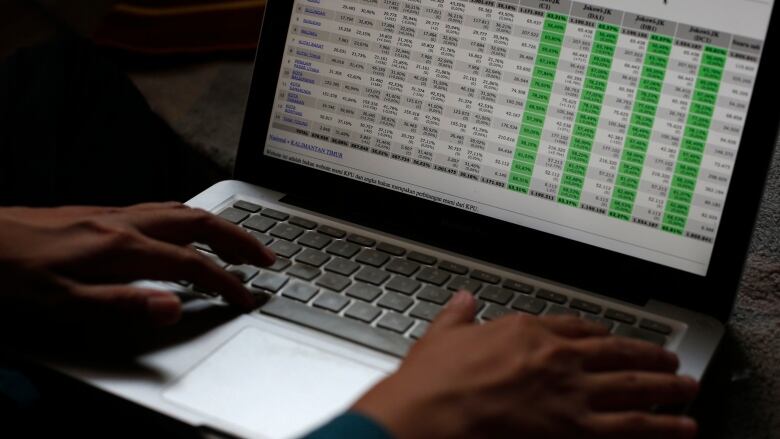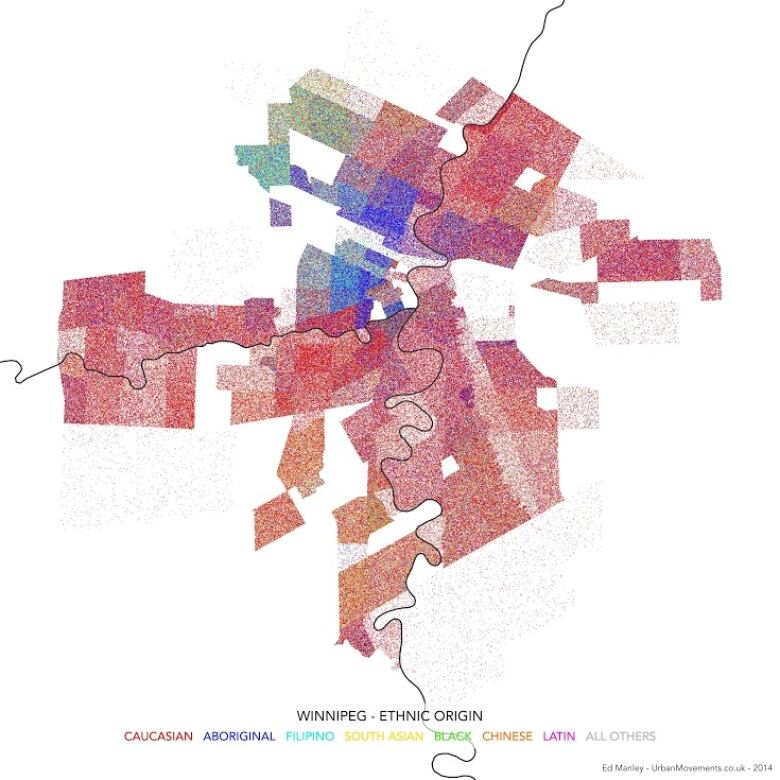'Open data': Why it's making waves across Canada
Advocates say opening up government data to 3rd-party analysis can change lives for the better

In Winnipeg,a map created using open census informationsheds light on the distribution of income, ethnicity and language across the city. In Montreal, an app that draws on municipal datahelps citizensavoid snow plowswhen parking their carsduring winter.In Waterloo, Ontario, students used city data tocreatean app that maps every single treethe city owns.
"Open data" is already shaping Canadians' lives, and open data advocates including academics, businesspeople and policymakers say opening up government databases for members of the public to analyze is leading to positive social outcomesfor Canadians.
- National open data summit held in Saint John
- LISTEN: National open data conference in Saint John
- Open Data Day opens up govt. information to the public
Open data can encompass a diverserange of information, including geographical maps and meteorological data, traffic data, real estate listings, building permits, health data, lists of government lobbyists, business licences and survey responses. Social scientists, activists, non-profits, computer programmers, educators and businesses can all analyzethat data for their own ends if it's made available to them.
"This is data that's ultimately been paid for by taxpayers, one way or another," said Joe Greenwood,program directorofMaRSData Catalyst at Toronto'sMaRSDiscovery District, a non-profit innovation centre.
"The government is a custodian, but not the owner, and it needs to put it out to maximum use in society," said Greenwood.
Open data already a reality in Canada
Greenwood presented at the annual Canadian Open Data Summit,whichjust wrapped up in Saint John. The conferenceattracted 215 attendees with an interest in the topic more than in previous years, saidorganizers.
Still, even Canadians who don't attend open data conferences probablyuse open data every day. The GPS function on smartphones relies on open government data, as does popular satellite mapping software like Google Maps.
In Halifax, open data was used to create an app that uses one's phone location to provide reminders to them about whether it's garbage or green bin pickup day.
If we want to do things well, we need to do evidence-based planning- TraceyLauriault, winner, 2016Canadian Open Data Leader of the Year Award
"Open data is all about breaking silos within communities, but then also across different stakeholders inside and outside government," said Jean-No Landry, executive director of Open North, which designs software and websites that useopen data.
In layman's terms, Landry is saying that open data has the potential to change the relationship between citizens and governments for the better. It's not hard to see why that concept appeals to policymakers and computer programmers alike.
The governments of Alberta, BritishColumbia, Newfoundland & Labrador, Nova Scotia, Ontario and Quebec all have open data websites from whichdata can be downloaded.New Brunswick Premier Brian Gallant announced a new open data policy in his province on Thursday.
In a press release, the government of New Brunswick said it had launched the policyto"increase transparency; improve public trust and citizen engagement; enhance research, science and innovation; facilitate the creation of new businesses and services; and improve government services."
Cities and open data: 'Absolutely fantastic'
Carleton University professorTracey Lauriault won the inaugural CanadianOpen Data Leader of the Year Award at this year's Canadian Open Data Summit, for being "atireless advocate whose engagement efforts have grown the open data community in Canada," according to a press release.
Lauriaultsays more than 55 Canadian cities now have open data strategies, and they're working together to exchange knowledge, case studies and digital tools.
"There's a lot of collaboration going on across jurisdictions," Lauriault said. "I think it's absolutely fantastic."

"If we want to do things well, we need to do evidence-based planning, evidence-based programming and evidence-based decision-making," said Lauriault. Opendata, she said, acts as "an enablerfor better programming and planning," and ultimately more efficient government, business,health care and education.
Open for business
It's not just civic activists and policymakers who are interested in open data. Commercial interests are also keen, both in terms of using government data for business purposes and in opening up their own data for profit.
"We need to look at using open data to build companies," saidKevin Tuer, managing director of the Open Data Exchange, which helps businesses useopen data for their own purposes.
"Our premise is that the private sector is particularly good at innovating and creating products and creating economic value," said Tuer, who chaired a workshop at the Canadian Open Data Summit.
Cities can allow the private sector to create open data products, said Tuer, and can then buy those products to improve municipal services.
Even though the data in question is produced by public spending, Tuer argues that services and products created by the private sector using open data can still benefit the public. He cites the Weather Network as an example even though it's owned by for-profitPelmorexMedia, the Weather Network harnesses vast amounts of government-generated meteorological data to produce its forecasts.
Not necessarily a panacea
Although some open data advocates tend to talk about their movement in purely glowing terms, open data isn't necessarily a panacea for social problems.
"Just because you have the raw data doesn't mean that you're necessarily going to see a complete picture," said Renee Sieber, an associate professor of geography at Montreal's McGill University who was part of a panel at the summit.
"If you don't have a category for a certain marginalized person in your dataset, that grouping of people disappears."
Additionally, said Sieber, governments have to realize that simply making data available isn't the same as making it accessible. Without helping citizens become data-literate to the point where they can analyze data, open data is only trulyopen to those with the special education required to use it.
"That's not the argument that the data shouldn't be open," said Sieber. "It's that it shouldn't stop at openness."
Sieberis adamant that shedoesn't want her critiques to dissuade governments from opening their data to the public.
The laudable goal of open data, Sieber says, is ultimately "to create a more inclusive society, a more transparent society, a more accountable society."












_(720p).jpg)


 OFFICIAL HD MUSIC VIDEO.jpg)
.jpg)



























































































